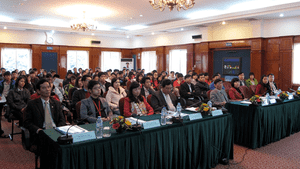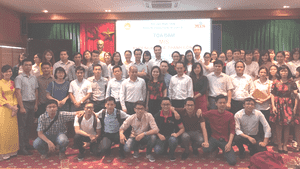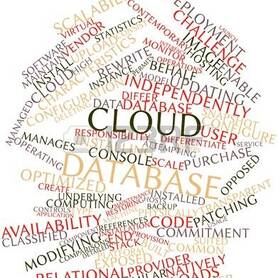
Core modules
I. Computer Science section |
1.Discrete Mathematics This subject provides students of economics information system of minimum knowledge of discrete mathematics which has been used as the fundermental knowledge for intensive study in computer science, including mathematical logic, Boolean algebra, graphs and applications. After this course, students will be supplied the algorithms which has applied for working and studying. |
2. Programming 1 This subject equips students basic knowledge of programming techniques; the basic steps to build a program using computers. The subject covers methods and techniques programmed by C programming language with the design methods toward modularity the program. After this course, students will obtain knowledge of basic algorithms and programming skills in a modern programming language. |
3. Programming 2 This subject provides the concepts, techniques of object-oriented programming and the methods to use C# language in the .NET framework to construct simple programs by these techniques. Besides, this subject includes the techniques to build management programs using Graph-User-Interface and the methods to connect to databases by ADO.NET based on Windows platform. |
4. Computer Architecture and Operating System This subject provides the concept, the major components, working principle of operating system and the function of the operating system includes of process control, memory management, file management, device management, interrupt... Moreover, the subject helps students to understand the instruction set, data representation, I/O mechanisms, addressing techniques… |
5. Database This course equips students with basic knowledge of databases. After finishing this module, students will have a correct perception of the role of the database, the system administrator SQL server database in the field of economic management in general and in the financial sector Bank says private; Ask learners the skills of data modeling, database design relations, construction, mining and database management. |
6. Database Management System This subject focuses on SQL server Database management systems. The subject introduces the basic concepts, working with tables, the queries, safety and security information ... in SQL server. Student can use SQL Server to build the management software running on a stand-alone computer or network. |
7. Data Structures and Algorithms This subject provides the basic knowledge about data structures and algorithms working on these data structures. The types of data structures to be studied including: list, array, linked list, stack, queue, tree, table hash. |
8. Informatics This subject provides students the basic and comprehensive knowledge about informatics as well as the exploitation of software applications on the computer and the Internet. After completing the course, students will have the knowledge necessary to continue to study applications of Informatics and other subjects related to information technology. |
9. Network and Communication This subject helps students develop their abilities to install network devices, to design a simple network for organizations, to build a network security system to avoid network threats. |
10. Network Construction and Administration This subject provides knowledge in theory and practice to build a local area network (LAN). This subject also offers basic and advanced knowledge about network administration on Windows Server system.After this course, students are able to construct and manage a computer network for agenciesand companies. |
II. Management information systems section
1. Introduction to Management Information System This course provides students with general knowledges about information systems, the role of information systems in organizations. This also helps students understand how information systems can be applied in organizations nowadays. |
2. Management Information System This course equips students with basic knowledge and comprehensive management information system, one of the important resources, vital decisions and competitive advantage in an organization's social and economic in the era of information. The course will give students aware of the strategic role of information management system in production and business activities by supporting decision-making and create competitive advantage for organizations. Futher more, it addresses the management of information systems development, resources and security. |
3. Web programming This course equips students basically with Web programming languages based on Linux/Unix environments such as PHP & MySQL, HTML, CSS, Javascript. After finishing this course, students can acquire necessary skills and knowledge in website applications developments and manage fairly common website systems. |
4. Advanced Web The objective of this course equips students with the knowledge on how to approach, find solutions, analyzing, designing a website modern system. After finishing this course, students can begin construction, consulting overall solutions and comprehensive. Helping business website systems achieve competitive advantage on the Internet. |
5. Economic information system developing This course provides students with concepts related to information system development processes in economy area. After finishing this course, students will have the ability to manage the information system developement processes as a business administrator, to understand the techniques neccessary for analyzing, desiging and implementing system. |
6. Business statistics This course equips students with basic statistical methods of data collection and data analysis. So they can evaluate the business activities of the organization. This course give students the skills to use SPSS statistical software. understand and use the results provided by SPSS. |
7. IT project management This course provides students with knowledge about project management, the methods to manage an IT project. This also helps students understand the role and the affect of each factor in the project. |
8. E-commerce This subject equips students with general knowledges about e-commerce in both theory and practice. This also helps students in using e-commerce tools and the internet to perform the business. |
9. Banking technologies |
10. Enterprise resource planning This course equips students with general knowledges about enterprise resource planning systems. After finishing this course, students can understand the whole processes in all activities inside an organization in order to give the most appropriate ERP solution. |
11. Core Banking With this course, students can understand Core Banking system technologies and the way banking operations implemented on Core Banking systems; set up Core Banking system models; design categories to evaluate Core Banking system replacement and implementation projects in commercial banks. |
12. E-banking |
13. Datamining This course provides to students basic knowledge about data mining and knowledge discovery: the concept, system architecture and characteristics; typical problems of classification, clustering, association rules; decision trees. |

















Bạn vui lòng đăng nhập tại đây để gửi bình luận.